Public Policy
1 - 18 of 25 articles
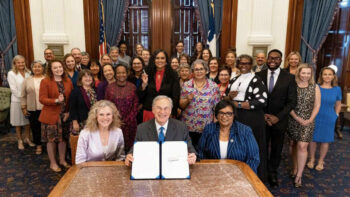
Texas Baptists celebrates passage of pro-life bills
Jul 6, 2023
“It’s really a new philosophy of care, from conception through the first three years of life.”
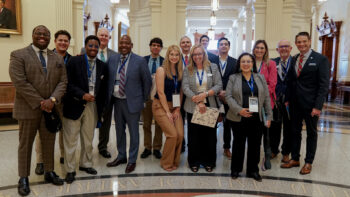
Advocacy Day promotes Texas Baptists’ public policy priorities for the 88th Legislative Session
Apr 26, 2023
Ministry leaders and Texas Baptists connected at the Capitol in Austin to discuss with legislators issues relevant to faith-in-practice during the 88th Texas Legislative Session.
The 86th Legislative Session in Review
Jul 19, 2019
The 86th Legislative Session has ended and most lawmakers have returned home. Here is a recap of some of their legislative accomplishments and failures of key legislation related to the 2018-2019 CLC legislative priorities.
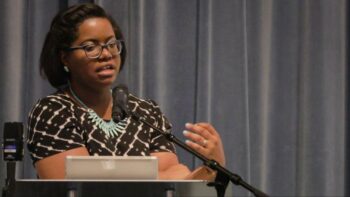
Kathryn Freeman leaving CLC after five years of service
Jul 18, 2019
It is with both sadness and excitement that I write to let you know we are losing a valued employee of the past five years -- Kathryn Freeman.
Kathryn will be leaving our staff the end of July in order to pursue her Master of Divinity degree full time at Baylor University's Truett Seminary. She also will be working with Truett.
Kathryn has led our public policy efforts since joining us in August 2014. She came to us as a practicing attorney with legislative staff experience, and she used her experience and abilities to further Texas Baptists's work in Austin. Kathryn especially brought a Matthew 25 emphasis on caring for "the least of these" through her policy work. The CLC has seen great success in advancing policy initiatives and blocking ill-conceived policy proposals.

Texas schools on track to receive financial infusion
May 9, 2019
By Girien Salazar
One of the top bipartisan legislative priorities, this session, has been improving the Texas public school system by increasing funding. As we approach the end of the session, Texas public schools are on track to receive a major financial investment. While both parties agree on the need to increase school funding, there are still many differences to work out between what the House and Senate want to see in the school finance bill.
Currently, HB 3 is in conference committee where select members will work together to hash out the differences between the House and Senate version of the bill. Texas voters still have the opportunity to encourage their elected officials to support an equitable school finance system.
More than 90 percent of Texas school children will attend Texas public schools. Increasing quality and funding for public schools is critical to having a highly skilled workforce and building a healthy Texas economy.
HB 3 would increase the basic per-pupil allotment for all school districts (from $5,140 to $5,880), which will inject $9 billion dollars into the school finance system. Texas needs a school finance system that propels students out of poverty and helps all students reach their full potential.
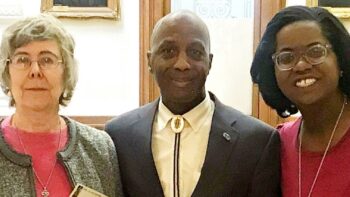
Donna Burney shows that everyone can advocate
Mar 22, 2019
Donna Burney is not your typical advocate, after serving as an English professor and then with Woman's Missionary Union, she retired. But, a few years ago, Donna became aware of the uncertainty facing women just released from prison.
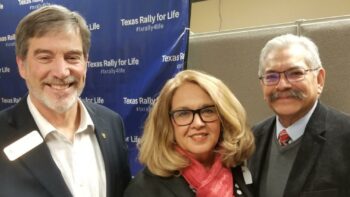
Encouraged by pro-life events in D.C. and Austin
Feb 1, 2019
Two events on two successive weekends have encouraged me. In mid-January, I witnessed busloads of people streaming into Washington, D.C., for the annual March for Life. One week later, I listened to thousands of people cheer during Austin’s Rally for Life.
Both events attracted large numbers of students and young adults. There’s an enormous concern evidenced by the thousands of students lifting up the importance and value of life.
A message can be gleaned from this -- pro-life supporters are not going away. And more and more pro-lifers understand that it is not just about abortion; we want to promote the value of human life from conception to natural death.
Children before birth are among the most vulnerable among us, but many women who are carrying these children are in vulnerable positions, as well. We need broad cultural understanding, support systems, and legal frameworks within which we promote the health of all children and their mothers.
In speaking at the Austin event, I noted that Texas Baptists believe every person is created in the image of God and, therefore, deserves our respect and honor from conception.
After reading Psalms 139:13-16 in both English and Spanish, I called for all Texans to work together in . . .

Heavenly citizenship extends to our earthly political engagement
Jan 3, 2019
During his keynote at our 2017 Advocacy Day, Dr. Vincent Bacote, a Christian ethicist and professor at Wheaton College, said, “people’s lives as disciples ought to matter every hour of the week.” Dr. Bacote argued that our Christian discipleship should include every aspect of our lives including our political engagement, but many of us struggle to bring our politics under the full authority of Jesus Christ and Scripture.
We often compartmentalize our lives as Christians. We give the Lord dominion over our lives for two hours on Sunday, but our money, our votes, our families belong to us. Even as we declare Jesus Christ as Lord, we treat Him as if the boundaries of His kingdom extend only as far as we are comfortable. But, citizens do not declare national boundaries, the boundaries of our country are determined by those in elected authority. Christians are citizens of a heavenly kingdom, and if we declare Jesus Christ is Lord, He determines the boundaries (Colossians 1).
Scottish missiologist, Lesslie Newbigin puts its this way, “[t]he confession ‘Jesus is Lord’ implies a commitment to make good that confession in relation to the whole life of the world — its philosophy, its culture, and its politics no less than the personal lives of its people.”
While our citizenship is ultimately in heaven, our heavenly citizenship should inform our earthly one. This is not a plea for theocracy; it is a plea for Christian principles to inform how you think about policy issues and political engagement. America is not a Christian nation, our Founding Fathers intentionally included language in the Constitution prohibiting a religious test for federal elected office.
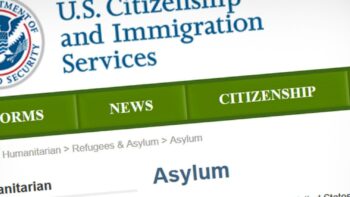
Seeking asylum: The migrant caravan and the crisis along the border
Nov 21, 2018
In the book of Exodus, a caravan of Israelites set out from Egypt to their new home in Canaan. They faced many challenges on their journey. Some groups along the way met them with kindness, while others failed to offer any grace.
In Deuteronomy 23:4, God bans Ammonites and Moabites from entering the assembly because of their failure to meet the Israelites with food and water in the desert. In Deuteronomy 10, God reminds the Israelites of His love for the foreigner and commands them to love the foreigner because they were once foreigners in Egypt.
Obviously, America is not Israel, and the same prescriptions placed on followers of Christ do not apply to a sovereign nation. Still, we presently face our own caravans. We can apply biblical principles to our personal responses as we seek to think biblically and consider just policy solutions.
Before discussing policy reforms, it is important to understand some basics about the immigration system. As followers of Christ we should not to bear false witness in our speech. Over the last several weeks we have been bombarded with news stories about a “diseased” migrants, “invading hordes,” “terrorists,” and “drug dealers.” These news reports have sensationalized this issue to stoke fear on this side of the border.
This blog post includes basic facts about the process for seeking asylum in the U.S. and how some of those in the migrant caravan might be allowed to legally stay in the U.S. In a second post, I will include some policy ideas that enhance border security and improve the process for seeking asylum.

Red Church, Blue Church: Why Christians Need to Avoid Hyper Partisanship
Sep 6, 2018
During the Texas Baptist Family Gathering, I led a workshop about how Christians can steward their public witness in an age of increasing tribalism. While the workshop room was packed, I think there are lessons from my workshop that deserve a broader audience because I am increasingly alarmed by the polarization in the church and what it is doing to our ability to make disciples. Many Christians are struggling within themselves to keep their partisan identities secondary to their identities as followers of Jesus Christ and it has lead to increased conflicts among believers.
According to a recent report by Lifeway, more than half of Protestant churchgoers under age 50 say they prefer to attend church with people who share their political views and few churchgoers say they attend services with people of a different political persuasion.
The increased partisan rancor in our country will have dire consequences. The church is following the culture rather than modeling how those of different political inclinations, races, genders, socioeconomic backgrounds can work together for the common good.Christians are increasingly moving to opposing corners based on politics, and our churches and our gospel witness is suffering because we have put our allegiance to our political parties before our allegiance to Christ and each other.
Unity does not mean uniformity. Democrats and Republicans -- not to mention partisans from Europe, Africa, Asia, and South America -- will be in heaven. Civic engagement and advocacy are important parts of what it means to be an American citizen, but we are first citizens of another kingdom, and must keep things in their proper order.
My pastor’s wife puts it this way, “Keep the main thing the main thing.” We are so beholden to our respective political parties we have lost sight of the main thing, namely the kingdom of God and our responsibility to make disciples.
Here are four pitfalls of the partisan trap for Christians and some suggestions for avoiding them.
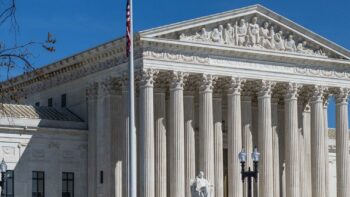
Masterpiece Cakeshop v Colorado Civil Rights Commission Explained
Jun 5, 2018
Monday, the Supreme Court decided Masterpiece Cakeshop v Colorado Civil Rights Commission in a 7-2 decision in favor of Masterpiece and its owner, Jack Phillips. While Phillips asked the Supreme Court to consider his First Amendment rights to freedom of speech and free exercise of religion, the Court actually only addressed his free exercise claim.

MURPHY VS NCAA: ¿SE LEGALIZARÁN LAS APUESTAS DEPORTIVAS EN TEXAS?
May 23, 2018
En una resolución histórica el lunes bajo el rubro Murphy vs NCAA, la Corte Suprema de los EE.UU. abolió la ley de Apuestas en Deportes Profesionales y Amateur (PASPA, por sus siglas en inglés), una ley que de manera efectiva prohibía las apuestas deportivas en la mayoría de los estados alrededor del país desde hace 25 años.

Murphy v. NCAA: Is Sports Gambling Coming to Texas?
May 18, 2018
By Caleb Seibert
In a landmark decision Monday entitled Murphy v. NCAA, the U.S. Supreme Court struck down the Professional and Amateur Sports Betting Act (PASPA), a law that effectively eliminated legal sports betting in most states around the country for 25 years.
The case pitted the State of New Jersey (Gov. Philip Murphy) against the National Collegiate Athletic Association and three professional sports leagues.
The court found that the law violated the “anti-commandeering” principle drawn from the 10th Amendment to the Constitution. This principle holds that Congress may pass laws that must be upheld by states, but it may not issue direct orders to state governments requiring them to take certain state legislative action.
This decision does not immediately legalize sports betting across the country, but it does allow states to legalize such activity in their state if they wish to do so.
As for the effect in Texas, Rob Kohler, a Christian Life Commission consultant, says, "The recent decision by the Supreme Court regarding gambling on sporting events really has no effect on the current gambling regulations in the State of Texas.” The current leadership of Texas has repeatedly rejected efforts to expand gambling in our state. Kohler concludes: “it will however, energize proponents of this, and other forms of gambling expansion in Texas in the upcoming legislative session in January 2019."

From Revolving Door to Highway of Redemption: The Church’s Response to 'Second Chance Month'
Apr 23, 2018
By Caleb Seibert
This month, the Christian Life Commission joined Gov. Greg Abbott and several groups to declare April “Second Chance Month” for formerly incarcerated individuals. Second Chance Month is an opportunity to highlight the challenges of formerly incarcerated individuals and their families and to share stories of redemption for those who have successfully overcome their criminal pasts.
Nearly 70,000 people are released from Texas state prisons every year, but most churches have little to no interaction with them. These people and their families often face a mountain of obstacles to re-entry ranging from work barriers and criminal debt to the deep stigmatization that comes with their past experiences.
Research by Lifeway Publishing in Nashville seems to echo this sentiment. After polling 1,000 Protestant churches, Lifeway found that 31 percent said no former inmates attended their church, 36 percent said one or two former inmates attended, and only 33 percent indicated three or more former inmates attending their church.
Hebrews 13:3 says to “remember those who are in prison, as though you were in prison with them.” How can Christians remember those who are in prison and those who have been released?
Here are four practical suggestions for ministry . . .

Our First Freedom: What You Need To Know About Religious Liberty
Mar 5, 2018
By John Litzler
Religious liberty is a bedrock American freedom, but a number of legal issues related to this freedom are being sorted out in the courts and news media today.
In some ways, the Supreme Court’s landmark 2015 Obergefell decision legalizing same-sex marriage in the United States raised more questions than it provided answers. In its opinion the Court concluded that “same-sex couples may exercise the right to marry” and also said “the First Amendment ensures that religious organizations and persons are given proper protection as they seek to teach the principles that are so fulfilling and so central to their lives and faith.” What happens when these two liberties appear at odds with one another?
One example of this conflict between freedoms occurred in both California and Colorado. In each place, a same-sex couple, exercising their right to marry, sought to hire a baker to create a cake for the couple’s wedding and in each case the baker declined asserting that the baker’s religious beliefs prevented the baker from making a wedding cake for a same-sex marriage.

Caring for All God’s Children: Children’s Health Insurance Program needs authorization
Oct 25, 2017
85th Legislative Session is Officially Over: A Special Session Report
Sep 29, 2017
Bills Are Moving; Help Them Across the Finish Line
May 12, 2017